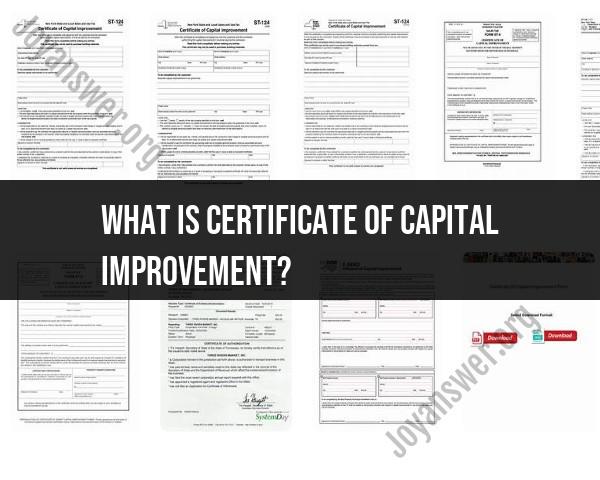What is Certificate of capital improvement?
A Certificate of Capital Improvement typically refers to a document or certification related to improvements made to real property, particularly in the context of construction or renovation that adds value to the property. The specifics of what constitutes a capital improvement can vary based on local laws and regulations. Here are some key points to understand:
Definition of Capital Improvement:
- A capital improvement, in the context of real property, generally refers to significant and lasting enhancements or additions that increase the property's value. This could include renovations, structural changes, or installations that go beyond routine repairs or maintenance.
Certificate of Capital Improvement:
- The Certificate of Capital Improvement is a document that verifies that a particular project or improvement qualifies as a capital improvement. This certificate is often required for various purposes, including potential tax benefits or exemptions.
Tax Implications:
- In some jurisdictions, capital improvements may be eligible for tax benefits or may be excluded from property tax assessments for a certain period. The Certificate of Capital Improvement may be used to support these claims, demonstrating that the work done falls into the category of improvements that qualify for such benefits.
Documentation Requirements:
- Property owners or contractors may need to provide detailed documentation of the improvement project to obtain the Certificate of Capital Improvement. This documentation may include project plans, invoices, receipts, and other relevant information.
Local Regulations:
- The criteria for what qualifies as a capital improvement and the procedures for obtaining a Certificate of Capital Improvement can vary based on local regulations and tax laws. It's important to check with the relevant local authorities or tax agencies to understand the specific requirements in a given area.
Exclusions:
- Not all improvements may qualify as capital improvements, and it's essential to distinguish between routine repairs and maintenance and significant enhancements that add value. Generally, repairs and maintenance are considered regular expenses and may not qualify for the same tax benefits.
Applicability to Real Estate Transactions:
- In some cases, the Certificate of Capital Improvement may be relevant in real estate transactions. For example, when selling a property, providing documentation of recent capital improvements can be a selling point, potentially increasing the property's market value.
As regulations and tax laws can vary, property owners, contractors, and individuals involved in property improvements should consult with local authorities, tax professionals, or legal advisors to ensure compliance with applicable laws and to understand the specific implications of capital improvements in their jurisdiction.
What does a Certificate of Capital Improvement entail?
A Certificate of Capital Improvement (CCI) is a document that certifies that a property owner has made a qualifying capital improvement to their real estate. Capital improvements are generally defined as permanent additions or modifications to a property that significantly increase its value or extend its useful life.
How does obtaining a Certificate of Capital Improvement benefit property owners?
Obtaining a CCI can provide several benefits to property owners:
Exemptions from Sales Tax: In many jurisdictions, materials and services used for capital improvements are exempt from sales tax. Obtaining a CCI can help property owners avoid paying sales tax on these expenses.
Reduced Property Taxes: In some cases, capital improvements can lead to an increase in the assessed value of a property, potentially resulting in higher property taxes. Obtaining a CCI may help property owners offset this increase by providing documentation of the capital improvement's cost, which can be used to apply for property tax reassessment.
Proof of Investment: A CCI serves as official documentation of a property owner's investment in their property, which can be valuable for future transactions, such as refinancing or selling the property.
What qualifies as a capital improvement for certificate purposes?
General guidelines for qualifying capital improvements include:
Permanent Fixtures: The improvement must be permanently attached to the property and cannot be easily removed.
Value Enhancement: The improvement must significantly increase the value of the property.
Useful Life Extension: The improvement must extend the useful life of the property.
Examples of qualifying capital improvements include:
New construction or additions to the property
Major renovations or upgrades
Installation of permanent fixtures, such as central air conditioning, security systems, or landscaping
Repairs that significantly extend the life of the property, such as replacing a roof or foundation
Are there tax implications associated with a Certificate of Capital Improvement?
Obtaining a CCI may have tax implications related to deductions or depreciation for the capital improvement. In some cases, property owners may be able to deduct the cost of the capital improvement from their taxes or depreciate the value of the improvement over time. It is advisable to consult with a tax professional to determine the specific tax implications applicable to a particular situation.
How does one apply for a Certificate of Capital Improvement?
The process for applying for a CCI varies depending on the jurisdiction. In most cases, property owners will need to contact their local tax assessor's office or tax department to obtain an application form and submit the necessary documentation, which may include:
A detailed description of the capital improvement
Itemized receipts or invoices for the materials and labor used in the improvement
Proof of ownership of the property
Photographs of the property before and after the improvement
Once the application and documentation are submitted, the tax assessor's office will review the information and issue a CCI if the improvement meets the qualifying criteria. The CCI may be valid for a specific period, and property owners may need to renew the certificate if they make additional capital improvements in the future.












